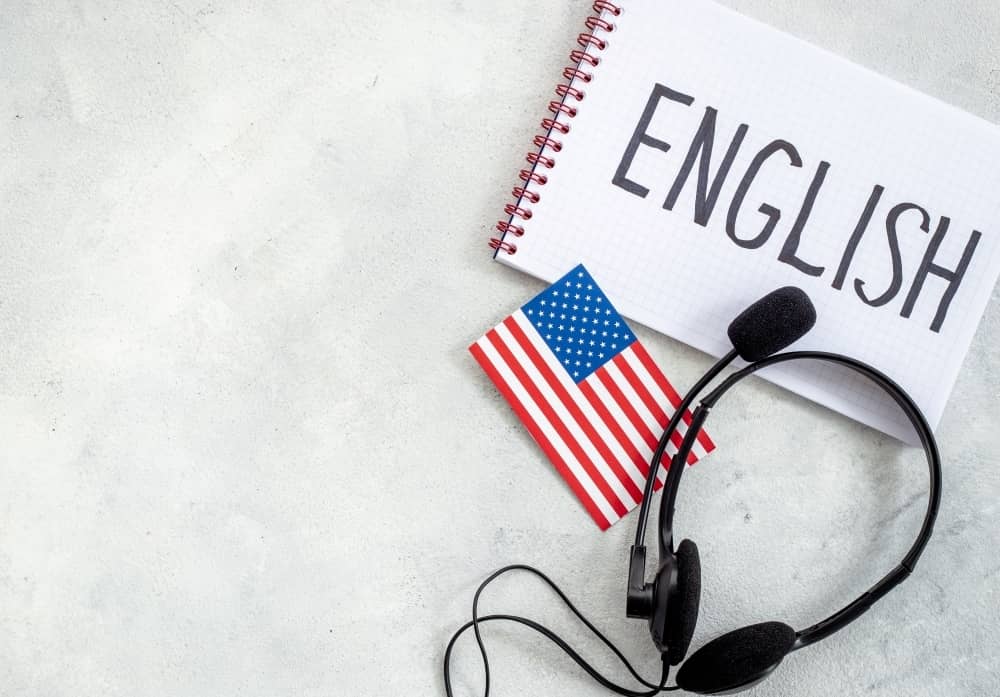
Even though American English has its roots in British English, the two can seem worlds apart if you are trying to master the pronunciation. With the proper training and enough practice, you will soon sound like a native speaker of American English.
In our American accent training course, you will learn exactly what you need to do to clearly and confidently speak with an American accent. Our course includes:
1. Learn the Sounds of the Standard American English Accent
Our American accent course has detailed instructions on how to learn the accent (called Rhotic) successfully. The term refers to the letter ‘R’ being pronounced every time it is used in a word, and so we have included training and instruction on how to make the American ‘R’ as well, for example, the ‘ar’ sound in farm, the ‘or’ in for, ‘er’ in her, and the unstressed ‘er’ usually at the end of a word like air, care or water.
To sound like an American, you must pronounce the vowels correctly. The American vowels can be short, medium or long in duration, and we include specific training on all the vowels with American trainers, so you know how to make them in your mouth.
- Some of the shorter vowels are the: ‘a’ sound in hat, the short ‘i’ sound in him and the ‘e’ sound as in bed.
- Some medium-length vowels are: ‘oo’ as in food; ‘ee’ as in seen; ‘or’ as in form.
- Some long vowels are: ‘ie’ as in line; ‘oe’ as in phone; ‘eer’ as in beer; ‘ai’ as in rain.
Use the ‘D’ Sound in place of the ‘T’ Sound
When the letter ‘t’ has a vowel before and after it, or an ‘r’ before it and a vowel after it, you should pronounce the ‘t’ as a quick ‘d’ sound. For instance, better would sound like ‘beder’, later sounds like ‘lader’, city is pronounced ‘cidy’ and party is said ‘pardy’ (the ‘y’ is considered as a vowel here as it says the vowel sound ‘i’).
Word Emphasis
American speakers rely on emphasis to help convey meaning to their listeners. The most important words in the sentence that receive focus are the content words, mainly; verbs, nouns, adjectives and adverbs mainly. These words convey the main meaning of the speaker’s message.
When emphasizing a word, there is usually a pitch change to assist with the emphasis. The pitch goes up and then down on the vowel in the main emphasized syllable. For example, in a single-syllable word such as ‘cat’, the pitch goes up and down on the ‘a’. In a longer word such as ‘analysis’ /əˈnæl.ə.sɪs/, the ‘nal’ syllable is said with the main emphasis (ie it is the main stressed syllable), and so the pitch goes up and down on this syllable.
2. Master the Neutral Vowel Sound ‘Schwa’
Students learning American accents often struggle with the neutral vowel sound, also called the ‘schwa’ sound. The sound can occur in words that begin with the letter ‘A’ such as in ‘again’, ‘around’, and ‘account’.
It also occurs in one or more syllables, in longer words with multiple syllables. For example, in the word ‘competition’ /ˌkɑːm.pəˈtɪʃ.ən/, the ‘e’ is said as a short ‘uh’ sound and not as ‘e’, and the ‘o’ is also said as a schwa vowel. This neutral vowel sound is the most common in English. It is an integral part of learning to speak American English with correct stress and rhythm so you don’t sound staccato or choppy.
You will find a wealth of instruction in our program to help you with the neutral vowel. The sound is sometimes described as a weak ‘uh’ sound. As you practise, you will notice many words with this sound.
3. Pronouncing American English Dialects
Regional dialects further complicate American accents. Our coursework teaches a standard American accent.
Southern Accent – While accents differ depending on American South regions, following a few rules can help you create a generalised southern accent. A key is changing vowel sounds.
- Draw your vowel sounds out. Slow down your speech by making your vowel sounds longer. For example, in the sentence: “It’s hot down here.” You would make the vowel sounds in the words ‘hot’ and ‘here’ longer.
- Because vowel sounds are drawn out, vowels can sometimes change e.g. the word ‘pen’, which is normally pronounced with the ‘e’ vowel, would be pronounced closer to an ‘i’ vowel instead; ‘pin’. The word ‘bill’, which is normally pronounced with a ‘i’ vowel, would sound like ‘beel’ instead.
Northeastern Accent – Even though the various regions of America’s northeast have distinct accents, you can sound more like a native speaker with our help. An important tip is to exchange words spelled with an O vowel (ie words that have an ‘ah’ sound in them), with “aw” (for the New York accent) or “uh.” (for the Boston accent). So, the word ‘call’ would sound like ‘kawl’ or ‘kuhl’, and ‘off’ is pronounced ‘awf’ or ‘uhf’.
Midwestern Accent – In the Midwest, American speakers add more melody and up-down rhythm to their vowel sounds. Try practising the words: hat, whose, go, and cow by raising your pitch and then lowering it as you say each vowel sound. These vowel sounds are longer than in the standard American accent, but not as long as in the Southern accent.
Californian Accent – Californian speakers tend to move their mouths more and use a hard-R whenever a word ends with R. They also use upward intonations sometimes at the ends of their sentences. This can make their sentence sound like a question even if it’s a statement, eg ‘We’re going to the sushi restaurant for dinner?’. Californians also sometimes drop consonant sounds at the ends of a sentence. For example for the sentence, ‘let’s get down to it’, you would either drop the ‘t’ sound at the end of the sentence or use a soft ‘t’ (not pronounce your ‘t’ sound as strongly/audibly). So, it would be ‘let’s get down to i’.
4. The Correct Use of Slang
Picking up phrases is not as challenging as it may seem. You will find more slang examples within the unscripted conversations and dialogue lessons in our courses.
Southern Slang – The easiest way to incorporate southern slang is by inserting a few simple words that you have practised. These words also happen to be contractions (otherwise known as ‘short forms’). Contractions are two words that are put together to form a shortened version of the word e.g. ‘have not’ becomes ‘haven’t’
Here are some common Southern contractions:
- The phrase ya’ll is used throughout the south instead of ‘you all’
- ‘ain’t’ instead of: is not’
- I’mma’ instead of ‘I’m going to’
Southerners will frequently use the word ‘bless’ in conversation as well as other descriptive terms like ‘smart as a whip’, or ‘pretty as a peach’.
Northeastern Slang – In the Northeast, words and phrases vary depending on where you are. So, in Boston, you will hear the word ‘wicked’ used in place of ‘really’ or ‘awesome’. In Philadelphia, the word ‘jawn’ is slang for a person, place or thing. Because it can replace any noun, context is crucial! The stereotypical New York slang of saying fuggetaboutit instead of forget about it with a New York accent is often joked about. The word ‘Bodega’ is used when referring to a deli/corner store (which is on almost every corner).
Midwestern Accent – Americans from the Midwest are notoriously polite and use thank you and sorry to excess. They also refer to sweet, carbonated drinks as pop and will call a group of people ‘you guys’.
Californian Slang- If you frequently sound excited and upbeat, you will fit in as a Californian speaker. Some Californians also the word ‘dude’ often (often younger people). This tends to be directed at a male, but anyone can be called dude in California.
5. American Accent Training Courses
Our American Accent Training Course will provide you with the tools you need, to begin changing the way you speak right away. Our coursework is divided into manageable sections, so you won’t be overwhelmed by excessive lessons. The course is online and you can log in and access it whenever you want, so going at your own pace is never a problem.
Speaking with an American accent is made easier because our coaches are experienced, highly trained, native speakers. They can assist you via our online course or through one-on-one lessons. They are ready (and excited!) to support your success.

